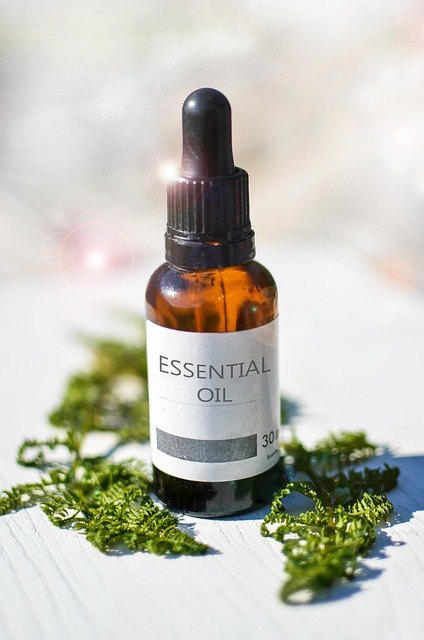Dr. Matthew Olesiak continues to make a significant impact in the medical field through his work at SANESolution and his dedication to evidence-based practices.
Is Peppermint Good for Sore Throat?
YES! Sore throat can be a real pain, but did you know that essential oils can provide relief in a natural and soothing way?
Peppermint, in particular, has been gaining popularity as an effective remedy for sore throat. But is peppermint good for sore throat? What makes it so powerful, and how can it be used to increase throat health?
Read on to discover in this Throat Health and Throat Cleaner guide, the potential of peppermint and other essential oils in combatting sore throat and making you feel better in no time!
Continue to learn more about your throat’s health with our How to Keep Your Throat Healthy: 6 Simple Ways and The Benefits of Lime Juice for Sore Throat Relief guides!

- New Report Says Your Brain Could Be the Key to Reducing Phlegm Over 50
- Doctor's "Leave The Throat Phlegm Behind" Tutorial Goes Viral With People Over 50
- Can You Relieve Throat Phlegm and Coughing In 60 Seconds A Day? This Doctor Says Yes
- How To Banish Phlegm When 50+ (Do This Every Day)
Short Summary
- Peppermint oil has antimicrobial, antibacterial and menthol content that can provide natural relief for sore throat symptoms.
- Peppermint tea is a soothing remedy with the addition of herbs such as thyme and chamomile Enhancing its calming effects.
- Essential oils should be used safely by following safety guidelines and consulting a healthcare professional before use much like taking Throat Cleaner.
Peppermint’s Power Against Sore Throat

Peppermint’s prowess in soothing sore throats lies in its unique combination of antimicrobial, antibacterial, and menthol content. These qualities make it an excellent natural remedy for treating sore throats caused by viral or bacterial infections. Peppermint essential oil, derived from the peppermint plant through steam or water distillation, is one of the most popular essential oils used to relieve pain and discomfort associated with sore throats.
Many sore throat medications contain menthol, a compound found in peppermint, which provides a cooling sensation that helps alleviate sore throat pain. The antimicrobial properties of peppermint essential oil combat viruses, bacteria, and fungi responsible for causing sore throats, while its antibacterial properties reduce bacterial growth. It’s no wonder that peppermint has become a go-to natural remedy for many throat medicines!
Antimicrobial Properties
Peppermint oil is a powerful weapon against a variety of bacterial and yeast species due to its antimicrobial, antiviral, and antifungal activities. These antimicrobial properties are primarily attributed to the combined effects of l-menthol, menthone, menthyl acetate, and limonene. This makes peppermint oil a natural alternative to over-the-counter medications for sore throat relief.
Combining peppermint oil with other essential oils, such as thyme or eucalyptus, can provide additional benefits for sore throat relief. These essential oil recipes harness the antimicrobial efficacy of multiple oils, targeting multidrug-resistant bacterial pathogens and providing anti-inflammatory properties.
Antibacterial Properties
The antibacterial properties of peppermint are attributed to the presence of compounds such as menthol, menthone, menthyl acetate, and menthofuran. Studies have demonstrated that peppermint is effective against a broad range of bacteria, including those responsible for sore throats.
These antibacterial properties not only help to reduce the growth of bacteria responsible for sore throat but also contribute to the overall health benefits of peppermint.
By incorporating peppermint oil into your daily routine, you can harness its antibacterial and antioxidant activities to support your immune system and combat various bacterial infections.
Menthol Content
Menthol, the compound responsible for the cooling sensation provided by peppermint, is a key player in alleviating sore throat pain. This cooling effect helps to decrease the intensity of pain, providing much-needed relief during a sore throat.
Menthol’s presence in many sore throat medications speaks to its effectiveness in providing relief.
By using peppermint oil or peppermint tea, you can benefit from the natural cooling sensation of menthol, which helps to alleviate the discomfort associated with sore throats and support your body’s healing process.
Peppermint Tea for Sore Throat Relief

Peppermint tea is a soothing and delicious way to experience the benefits of peppermint for sore throat relief. The warm liquid can provide a comforting sensation, while the anti-inflammatory properties of peppermint help to reduce inflammation and ease throat discomfort.
Incorporating other herbs, such as thyme and chamomile, can further enhance the soothing properties of peppermint tea.
Thyme and chamomile possess anti-inflammatory and antispasmodic properties, providing a calming and comforting effect on the throat.
Benefits of Peppermint Tea
Peppermint tea offers a multitude of advantages beyond sore throat relief. It has been known to enhance digestion, alleviate congested sinuses, and aid with sleep. The calming effects of peppermint tea can also help relieve symptoms of indigestion, bloating, and gas and even reduce nausea and vomiting.
Additionally, peppermint tea has been found to stimulate the brain and provide a boost of energy, thereby improving focus and concentration.
By including peppermint tea in your daily routine, you can enjoy its many health benefits, including relief from sore throat symptoms.
Peppermint Tea Recipe
To prepare a soothing peppermint tea with thyme and chamomile at home, simply steep 1 teaspoon of dried peppermint leaves, 1 teaspoon of dried thyme leaves, and 1 teaspoon of dried chamomile flowers in 1 cup of boiling water for 10 minutes.
Strain the mixture and enjoy the comforting warmth and relief that this herbal infusion provides.
Using Peppermint Essential Oil for Sore Throat

Peppermint essential oil can be used in several ways to help relieve sore throat symptoms. From steam inhalation to topical application, this versatile oil offers a variety of options for those seeking natural relief.
Whether you’re diffusing peppermint oil in the air or applying it directly to the throat, the soothing properties of peppermint can help you feel better in no time.
Before diving into the different ways to use peppermint essential oil for sore throat relief, it’s important to keep in mind that essential oils should be used with caution and only after consulting a healthcare professional to ensure safe usage.
Steam Inhalation
Steam inhalation is a natural therapy that can help alleviate respiratory symptoms, such as congestion, cough, and inflammation. Adding peppermint oil to the mix can enhance the benefits of steam inhalation by further reducing mucus buildup and providing relief for sore throat.
To perform steam inhalation with peppermint oil, simply add a few drops of the oil to a bowl of boiling water. Place a towel over your head, close your eyes, and inhale the steam for 5-10 minutes. This method can help open up airways, loosen mucus, and provide temporary relief from inflammation.
Topical Application
The topical application of peppermint oil offers another way to soothe sore throat pain and reduce inflammation.
By applying a diluted mixture of peppermint oil and a carrier oil, such as coconut or jojoba oil, directly to the neck and chest area, you can experience the soothing effects of this natural remedy.
It’s important to note that essential oils should never be applied undiluted to the skin. To create a 2.5% dilution for adults, add up to three drops of essential oil to one tablespoon of carrier oil. This essential oil recipe will help prevent any potential adverse reactions and ensure safe use.
Diffusing Peppermint Oil
Diffusing peppermint oil in the air can create a soothing atmosphere that offers relief from sore throat symptoms. The aroma of peppermint oil can help reduce inflammation in nasal passageways, reduce congestion, and promote better sleep.
To diffuse peppermint oil, simply add a few drops to an essential oil diffuser filled with water and turn it on. The diffuser will disperse the peppermint oil into the air, creating a comforting environment that aids in sore throat relief. Be sure to follow any safety precautions outlined by the diffuser manufacturer and avoid diffusing for longer than 30 minutes at a time.
Other Essential Oils for Sore Throat Relief

Peppermint isn’t the only essential oil that can provide relief from sore throat symptoms. Other essential oils, such as lavender, eucalyptus, and lemon, also offer powerful benefits that can help soothe a sore throat and promote overall well-being.
By experimenting with various essential oils, you can find the perfect combination that works best for your individual needs. Whether you choose to use essential oils individually or in combination, the versatility and effectiveness of these natural remedies make them a valuable addition to your arsenal against sore throats.
Lavender Essential Oil
Lavender essential oil, known for its calming and soothing effects, possesses anti-inflammatory and antimicrobial properties that can help alleviate sore throat discomfort. Its gentle nature makes it suitable for use by people of all ages, making it a popular choice for those seeking natural relief from sore throat symptoms.
Incorporating lavender essential oil into your sore throat relief routine can provide additional benefits, such as reducing stress levels and promoting better sleep. This can help improve overall well-being and make the healing process more comfortable.
Eucalyptus Essential Oil
Eucalyptus essential oil, derived from the leaves of the eucalyptus tree, is another powerful ally in the fight against sore throats. Its antibacterial properties make it an effective natural antibiotic for treating infections.
In addition to its antibacterial properties, eucalyptus essential oil has been shown to reduce inflammation, relieve respiratory issues, and even improve skin health. By incorporating eucalyptus oil and tea tree oil into your sore throat relief routine, you can benefit from their healing properties and experience improved overall health.
Lemon Essential Oil
Citrus lemon essential oil, known for its fresh, uplifting scent, possesses antimicrobial and antioxidant properties that can help treat sore throats and prevent infection.
Its cleansing properties make it a popular choice for use in perfumery and culinary practices, as well as for relieving mild symptoms of anxiety and depression. Lemon essential oils, being a concentrated form of this citrus oil, offer similar benefits. Thyme essential oil, another popular essential oil, also has various applications in aromatherapy and natural remedies.
Incorporating lemon essential oil into your sore throat relief strategy can provide additional benefits, such as alleviating nausea and pain.
By harnessing the power of lemon essential oil, you can promote a healthy immune system and help your body fight off infections more effectively.
Precautions and Safety Tips for Using Essential Oils

While essential oils can provide a wealth of benefits for sore throat relief and overall well-being, it’s important to use them safely and responsibly. Proper dilution, storage, and application are crucial to ensuring that essential oils remain effective and safe for use.
In addition to general safety guidelines, it’s important to be aware of any specific precautions or contraindications for each essential oil you use. For example, peppermint oil should not be used on or near the face of infants and young children, as it may cause breathing difficulties.
By following safety guidelines and consulting a healthcare professional before using essential oils, you can enjoy their benefits with peace of mind.
General Safety Guidelines
When using essential oils, it’s essential to dilute them with a carrier oil before applying them to the skin. This helps prevent any potential adverse reactions and ensures safe usage. To evaluate for potential allergic reactions, apply a small amount of diluted oil to the inner arm and wait 24 hours. If no adverse reaction is observed, the oil is considered safe for use.
Essential oils should also be securely stored in a place that is inaccessible to children and pets, as many essential oils are toxic or even fatal for animals, particularly cats if they ingest essential oils. By following these general safety guidelines, you can protect yourself and your loved ones while enjoying the benefits of essential oils.
Peppermint-Specific Precautions
There are a few specific precautions to keep in mind when using peppermint oil. Inhaling large amounts of menthol may result in dizziness, confusion, muscle weakness, nausea, and double vision. Additionally, individuals with cardiac fibrillation or G6PD deficiency should exercise caution when using peppermint oil.
By being aware of potential side effects and interactions with medications, you can use peppermint oil safely and effectively to treat your sore throat and enjoy its many health benefits. Always consult a healthcare professional before using essential oils, especially if you have any pre-existing medical conditions or concerns.
Summary
Essential oils, particularly peppermint, offer a natural and effective way to combat sore throat symptoms and promote overall well-being. Whether you choose to use peppermint tea, essential oil inhalation, or topical application, the versatile properties of peppermint and other essential oils can provide relief and comfort during your healing process. Remember to follow safety guidelines and consult a healthcare professional before using essential oils to ensure safe and effective usage. Now, armed with the knowledge of these powerful natural remedies, you can confidently tackle your sore throat and get back to feeling your best!
Frequently Asked Questions
How do you use peppermint for a sore throat?
Sucking on peppermint candy or drinking peppermint tea can help ease a sore throat. Peppermint has antibacterial and antiviral properties, making it useful for aiding healing.
Additionally, many cough drops include menthol to break up mucus.
Are candy canes good for sore throat?
The menthol in peppermint can decongest nasal passages and soothe the throat, making candy canes a great option to relieve sore throat symptoms.
Enjoy the sweet treat for a comforting experience.
Can I drink peppermint tea with a sore throat?
Yes, peppermint tea can provide relief from a sore throat due to its naturally high levels of menthol that help clear congestion and relax muscles.
Menthol has a cooling effect that can soothe the throat and reduce inflammation. It also has antibacterial properties that can help fight off infection. Additionally, peppermint tea is caffeine-free, so it won’t interfere with your health.
What makes peppermint effective against sore throat?
Peppermint’s antimicrobial, antibacterial properties, and menthol content make it effective against sore throats.
What are the benefits of steam inhalation with peppermint oil?
Steam inhalation with peppermint oil can help reduce mucus buildup and provide relief for sore throat, thus offering a natural remedy for respiratory issues. It is a simple and effective way to soothe the throat and clear the airways. The steam helps to loosen the mucus, while the peppermint oil helps to reduce inflammation and provide a cooling sensation.

Dr. Matthew Olesiak continues to make a significant impact in the medical field through his work at SANESolution and his dedication to evidence-based practices.



